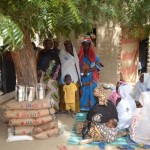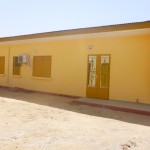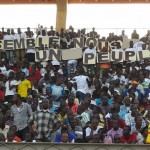
After losing her husband two years ago, Mohamed Agaïcha, a mother living in rural Timbuktu, lacked an adequate source of income and found herself unable to provide enough food for her five children. Agaïcha’s family is one of the hundreds of thousands of families affected by the ongoing conflict and violence in northern Mali.

During the occupation of northern Mali in 2012, Malian Government representatives were among the first to flee, leaving already weak public services nonexistent. Armed groups took advantage of the security vacuum and the abandoned buildings, using public administration offices as headquarters and barracks. Looters also vandalized and stole from the buildings, further destroying public resources.

As ethnic tensions flare and calls for a return to war are audible on the streets of Bamako, USAID, through its Office of Transition Initiatives, recognizes the need to counteract calls for violence. Through its Mali Transition Initiative (MTI), USAID organized an emergency meeting in May 2014 at the MTI office in Bamako with representatives of youth associations and all agreed: A coherent, consistent message of peace from Malian civil society could deliver messages to advocate for peace and unity.
June 2014—In Mali, women-owned and -operated farms for sorghum and millet crops are common, but it is rare to find women managing the companies that transport and process these grains that are staples in Malian diets.

March 2014—The occupation of Timbuktu in 2012 was a traumatic experience for the entire community, but particularly the youth, who were targeted by armed extremist groups who imposed brutal interpretation of Sharia law.








Comment
Make a general inquiry or suggest an improvement.